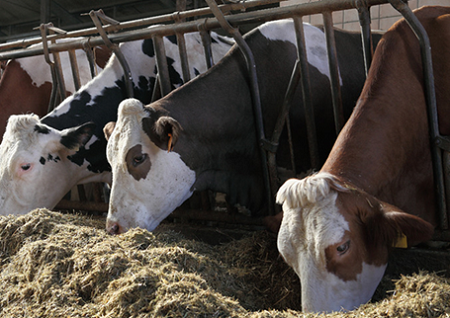Technologies and Big Data
FACCE-JPI Workshops on Technologies and Big Data provide input to next steps for joint programming

The Technologies and Big Data Workshops were organised by FACCE-JPI in order to foster the adoption of existing and emerging technologies and to identify the potential role of big data for food security with a focus on collecting data, translating data into information, and promoting and facilitating use of the information by end-users. The Technologies Workshop was attended by 41 policy representatives and experts from 13 countries. The Big Data Workshop was attended by 43 representatives and experts from 15 countries.
Karin Andeweg attended both meetings on behalf of the Global Research Alliance on agricultural greenhouse gases (GRA) as deputy of GRA co-chair Martin Scholten. Andeweg is project manager Livestock & Environment at Wageningen Livestock Research and is one of the coordinators of the WUR Big Data programme.
"Using Big data techniques in the field of agriculture, food security and climate change is still in an early stage", Andeweg states. "Increasing access to data sources (open data) and combining data to create added value are first steps to take. Sharing best practises at workshops like the FACCE-JPI workshop, can have an accelerating effect on the development of big data in this area. At such meetings, presentations of inspiring examples with added value of big data will encourage research institutes and governments to cooperate and to give access to data. Furthermore, setting priorities for joint programming can support open data to create added value for agricultural developments, also in the developing world", she says.
Breeding for lower GHG emissions
The GRA, in cooperation with the Sustainable Agriculture Initiative (SAI) platform, published in 2015 an overview of best practices and emerging options to reduce emissions from livestock. The interventions discussed in this publication are still valid for the food security, agriculture and climate change nexus.
Andeweg gives an example to show the possibilities of big data in the context of greenhouse gas emissions reduction in livestock: "Livestock is responsible for 14.5% of global greenhouse gas emissions. 65% of these emissions comes from cattle and consists for a large part of methane. The methane emitted by cattle is partly determined by the composition of feed and partly fixed genetically. For the genetic part, targeted breeding has considerable potential to reduce GHG emission. However, adequate breeding programmes require a large amount of data from as many cows as possible in order to get good results. Therefore, access to data and combining these data is a prerequisite to make breeding for lower methane emissions successfull".
"Making data accessible for climate research is a focal point of both WUR and the GRA", says Andeweg. "Participation in the technologies and big data workshop was therefore important for both organisations. At such workshops you can bring in the key points of your organisation in order to finally determine common priorities and to make agreements on the development of big data. Subsequently, the outcomes of the workshop enable me to give well founded advice to WUR and the GRA on this topic" mentions Andeweg.
Headlines of the workshop
The workshops will provide input to the FACCE-JPI Governing Board on next steps for joint programming. There is huge interest from the Member States to work on big data, as overarching topic in current research themes. One of the recommendations is to support open data and/or the FAIR principles in FACCE’s projects. FAIR is a set of guiding principles to make data Findable, Accessible, Interoperable, and Re-usable. Another one is to start with data mining on this topic, including opportunities for connectivity. This could be done by a new joint research call on big data related to FACCE’s core themes and the creation of a Knowledge Hub on big data and use of technologies in the food security, agriculture and climate change field. Co-creation with farmers, private sector, policy-makers and society is considered important in further developments.
Policy makers in the spotlight with joint programmes
Joint programming is about aligning research & research funding. At the policy level, this includes finding and assembling national priorities into a common research agenda, shared and supported by the national governments involved. In a series of interviews, Dutch policy-makers and funders, as well as researchers from Wageningen University and Research present their part in the joint programming process.
For more information, contact Dorri te Boekhorst or Christine Bunthof.
